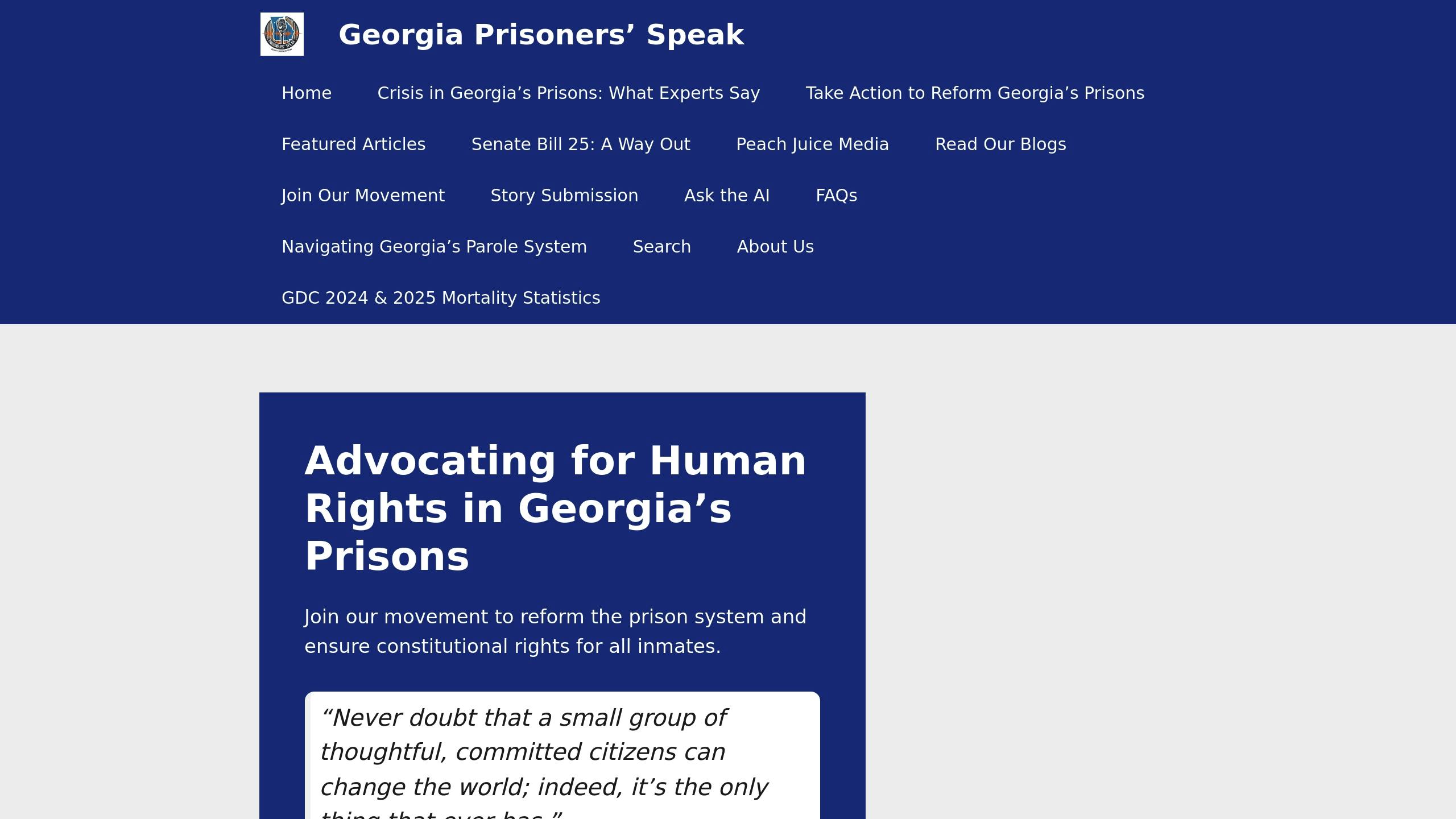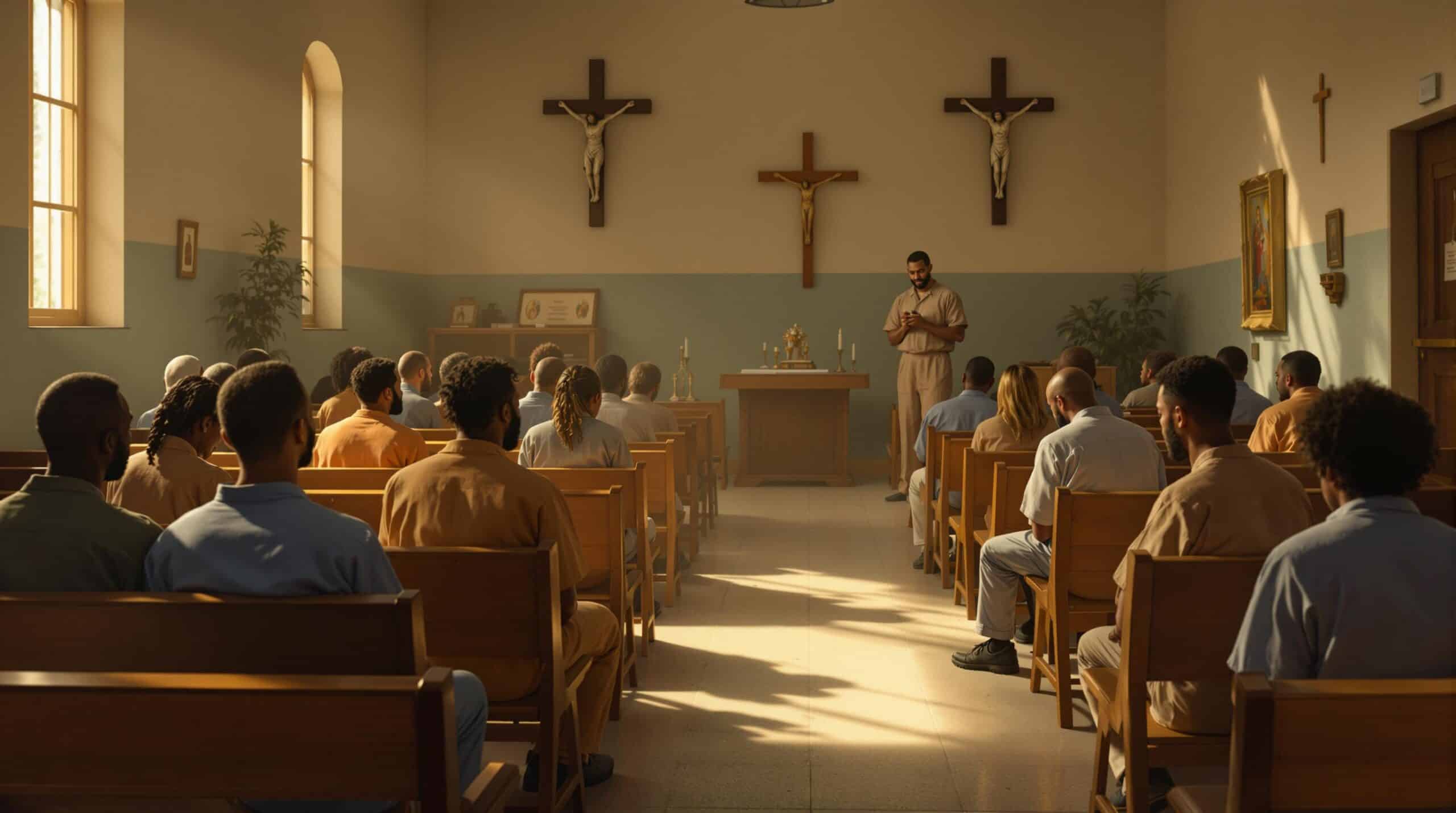Religious rights are essential for inmates in Georgia prisons, helping with rehabilitation and personal growth. Laws like the First Amendment and RLUIPA ensure inmates can practice their faith while balancing prison security needs. Here’s what you need to know:
- Faith-Based Programs: Reduce recidivism rates (as low as 8%) and improve mental health.
- Legal Protections:
- First Amendment: Guarantees religious freedom within reasonable security limits.
- RLUIPA: Prohibits discrimination and requires accommodations unless there’s a compelling government interest.
- Common Accommodations:
- Worship services, prayer spaces, and religious items.
- Dietary needs like Kosher or Halal meals.
- Grooming practices tied to faith.
While security concerns may limit some practices, prisons must justify restrictions and explore less restrictive alternatives. Advocacy groups like Georgia Prisoners’ Speak are pushing for reforms to address ongoing issues like limited prayer spaces and delayed access to religious property. Supporting these efforts can help uphold constitutional rights in correctional facilities.
Laws Governing Religious Practice in Prison
First Amendment Rights in Prison
The First Amendment safeguards religious freedom in Georgia prisons, but these rights are balanced against the need to maintain security and order. Prisons are required to make reasonable accommodations for religious practices. The Turner v. Safley case introduced a "reasonableness" test that courts still apply to assess restrictions on inmates’ constitutional rights . This framework ensures that prisons address both security concerns and the reintegration of inmates.
Prison officials must show that any limits on religious practices are directly tied to legitimate security or operational needs. In other words, restrictions can’t be based on vague preferences or administrative convenience.
For example, while prisons can regulate access to religious materials, outright bans often face legal challenges. In one case, the Department of Justice challenged Berkeley County Detention Center‘s blanket ban on religious publications, including the Koran and Our Daily Bread. The resulting settlement reinstated access to these materials .
RLUIPA Requirements for Prisons
In addition to First Amendment protections, the Religious Land Use and Institutionalized Persons Act (RLUIPA) sets stricter standards for religious accommodations. This federal law prohibits prisons from imposing substantial burdens on religious practices unless they meet specific criteria:
| Requirement | Description |
|---|---|
| Compelling Interest | The restriction must address a critical government need |
| Least Restrictive Means | There must be no alternative that is less restrictive |
| Safe Harbor Provision | Facilities can avoid lawsuits by adjusting policies that interfere with religious practices |
"Under federal law, a prison or jail cannot substantially burden a prisoner’s exercise of his or her religion unless it can demonstrate that it has a compelling interest that cannot be achieved through any other less restrictive means." – ACLU
A notable example occurred in 2019 when a federal court invalidated the Georgia Department of Corrections‘ policy limiting beard length to half an inch without religious exemptions. The ruling required accommodations for beards up to three inches .
The Department of Justice actively enforces RLUIPA, stepping in when prisons fail to meet these standards. This has led to practical changes in facilities, such as:
- Providing religiously appropriate diets
- Allowing religious grooming practices
- Ensuring access to worship services
- Permitting possession of religious items
These measures acknowledge the importance of religious practices in helping inmates rehabilitate and reintegrate into society .
Religious Rights and Prison Restrictions
Protected Religious Activities
Georgia prisons are required to respect a variety of religious practices while ensuring the facility remains secure. Here are some common religious activities that are typically upheld under the First Amendment and RLUIPA:
| Religious Practice | Protected Activities | Key Accommodations |
|---|---|---|
| Worship Services | Individual and group prayer | Specific prayer times and designated spaces |
| Dietary Requirements | Faith-based meal options | Kosher, Halal, and other religious diets |
| Religious Items | Personal religious materials | Access to sacred texts, prayer rugs, and headwear |
| Religious Grooming | Appearance tied to faith | Exceptions for beard length, hair styling |
| Religious Holidays | Special observances | Adjusted schedules for ceremonies |
These rights extend to all religious beliefs, whether they are widely practiced or not . For instance, Jewish inmates must have access to kosher meals, and Muslim inmates must be provided with appropriate prayer spaces and times. The Georgia Department of Corrections is prohibited from discriminating against less common religions, as long as the beliefs are sincerely held. However, security concerns may lead to some limitations on these practices.
Security-Based Restrictions
To maintain order, prisons may need to adjust or limit certain religious activities. Restrictions are allowed only when practices:
- Clearly threaten safety
- Cause major disruptions to operations
- Compromise hygiene or create significant administrative challenges
For example, if an inmate’s ceremonial knife is deemed a security threat, prisons might allow a supervised replica or limit its use to specific times and locations .
Any restrictions imposed by the Georgia Department of Corrections must be well-documented and justified. If challenged, officials must demonstrate that their actions address a compelling government interest and that no less restrictive alternatives are available .
sbb-itb-7858f51
Can Prisoners Practice Their Religion in Prison?
Current Issues in Religious Rights
Religious rights often clash with prison security in Georgia’s correctional facilities. A notable case, Rodriguez v. Burnside, involved a Muslim inmate challenging a policy that required him to wear boxer shorts and handcuffs during shower escorts. The Eleventh Circuit Court clarified its perspective:
"The question is not whether the prison accommodated every aspect of [Rodriguez’s] religious practice, but whether he was allowed other means of practicing his religious beliefs."
Inmates encounter several barriers to practicing their faith, including the following:
| Issue | Impact | Current Status |
|---|---|---|
| Dietary Accommodations | Limited access to religious meals during holidays | Muslim inmates report challenges obtaining outside food for religious observances |
| Prayer Spaces | Lack of dedicated prayer areas | Muslim prisoners cite unequal access to worship facilities |
| Religious Property | Delayed administrative processes | Significant delays in resolving property-related disputes |
| Religious Discrimination | Reports of bias incidents | Seven complaints of discrimination filed with the Public Defender’s Office in 2023 |
These issues highlight the urgent need for focused reform efforts.
Georgia Prisoners’ Speak: Advocacy for Prison Reform

Georgia Prisoners’ Speak (GPS) plays a vital role in advocating for religious rights within the state’s prisons. This initiative sheds light on constitutional violations and poor living conditions affecting approximately 50,000 incarcerated individuals .
GPS focuses on three core areas:
- Documenting violations of religious rights
- Offering legal support to inmates
- Increasing public awareness of systemic problems
Additionally, the Media Development Foundation recorded 48 instances of religiously intolerant statements in Georgian media by September 2023 . Advocacy efforts also spotlight events like the Buknari Village incident , emphasizing the need for stronger oversight and reforms to ensure religious freedoms are respected without compromising security.
Conclusion: Religious Rights Status
Main Points Review
The Religious Land Use and Institutionalized Persons Act (RLUIPA) requires Georgia prisons to avoid imposing unreasonable restrictions on religious practices. Enforcement by the Department of Justice has brought noticeable changes to correctional facilities nationwide.
Here are a few recent legal cases that demonstrate the impact of oversight:
| Case Example | Outcome | Impact |
|---|---|---|
| Utah Prison Investigation | Prison provided vegan meals | Met Hindu dietary needs |
| Berkeley County Case | Consent injunction obtained | Restored access to religious materials, including the Koran |
| Sukhjinder Basra Case | State regulation repealed | Protected a Sikh prisoner’s right to keep his beard |
These examples show how legal action can defend inmates’ religious freedoms while maintaining prison security. They emphasize the importance of ongoing advocacy in driving reforms.
How to Help
You can play a role in protecting religious rights in Georgia prisons by documenting violations and pushing for change. Using the momentum from these legal successes, individual contributions remain vital.
Here’s how you can help:
- Report violations: Share concerns with the Department of Justice’s Civil Rights Division.
- Support legal advocacy: Donate to groups like Georgia Prisoners’ Speak.
- Raise awareness: Share credible information about prison conditions and religious rights violations.
Legal efforts are key to continued progress. By backing organizations focused on prison reform and religious freedoms, individuals can help ensure that Georgia’s prisons respect constitutional rights while maintaining security.
